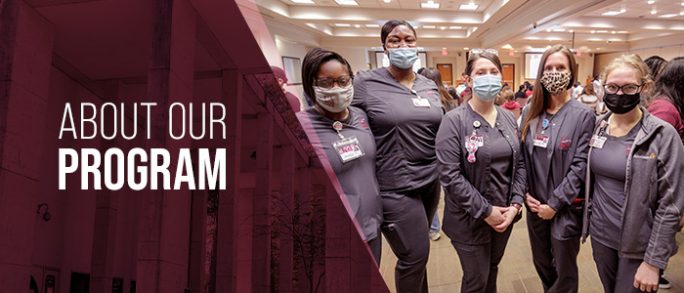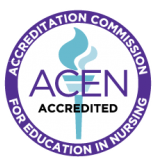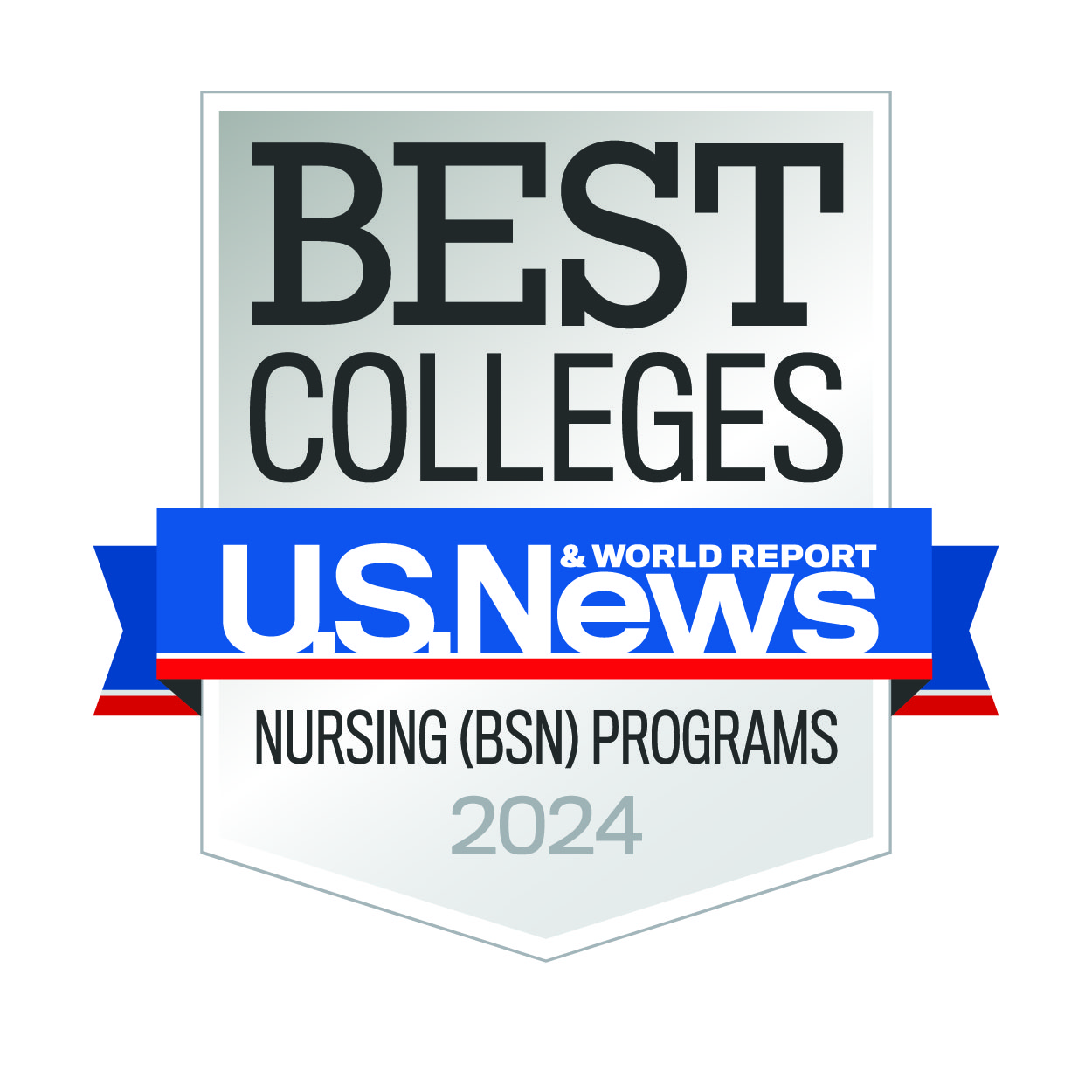The UA Little Rock School of Nursing is a vital member of the Little Rock community. For nearly 50 years, the school has educated nurses and is responsible for placing them across the state, region, and country.
UA Little Rock-educated nurses are highly regarded by employers as well-prepared outstanding critical thinkers and communicators. The school is the largest department on campus with more than 600 current students, 20-plus full-time faculty, and six dedicated staff members. For fiscal year 2024, we had an NCLEX RN pass rate of 92.26%.
The School of Nursing at UA Little Rock located in Little Rock, AR is accredited by the:
Accreditation Commission for Education in Nursing (ACEN)
3390 Peachtree Road NE, Suite 1400 Atlanta, GA 30326
(404) 975-5000
View the public information disclosed by the ACEN regarding this program.
The most recent accreditation decision made by the ACEN Board of Commissioners for the Associate of Applied Science Program is Continuing Accreditation.
The most recent accreditation decision made by the ACEN Board of Commissioners for the RN-to-BSN Program is Continuing Accreditation.
I. Mission
To utilize teaching, scholarship, and service to empower graduates to be change agents while promoting health and wellness in diverse populations across the state of Arkansas and beyond.
II. Values
- Caring, the heart of nursing embodies compassion, mentoring, comfort, and advocacy.
- Professionalism is the consistent demonstration of accountability, reliability, and stewardship.
- Integrity is choosing to exhibit behaviors of honesty and trustworthiness while adhering to moral and ethical principles regardless of the situation.
- Respect is displayed by treating oneself and others with dignity, kindness, and consideration.
- Diversity fosters success through recognition of and attention to social and cultural variations.
- Excellence is the implementation of high-quality, evidence-based practice, lifelong learning, and competent care. It is centered on an unwavering commitment to teaching, scholarship, and service.
III. Vision
Inspiring excellence. Transforming care. Creating leaders.
IV. Highlights
Announcements
- Dr. Elizabeth Lee retired in December 2021 after 9 years of service to the School of Nursing.
- Four new faculty members have joined our team:
- Stephanie Bartlett, MSN, RN, WHNP-BC
- Lindsey Leslie, BSN, RN
- Preston Molsbee, EdD, RN, FAADN
- Kyrsten Smith, BSN, RN
- The Center for Simulation Innovation secured nearly $400,000 in funding in 2020-21:
- The Walker Foundation – $165,000
- CARES Act – $70,000
- UA Little Rock and School of Nursing – $140,000
Teaching
- Six UA Little Rock faculty members were named to the 2021 40 Nurse Leaders Under 40 list:
- Lakeisha Falls, DNP, RN
- Joanna Hall, MNSc, RN
- Farren Moore, MSN, RN
- Crystal Rose, PhD, RN, CNE
- Fairah Solomon, MSN, RN, CNE
- Anna Williams, MSN, RN, CNE
- Four UA Little Rock faculty successfully passed the Certified Nurse Educator exam:
- Lindsey Baertlein, MSN, RNC-MNN, CNE
- Josy Nduku, DNP, RN, CNE
- Crystal Rose, PhD, RN, CNE
- Anna Williams, MSN, RN, CNE
- Two UA Little Rock faculty members were named to the Great 100 Nurses of Arkansas in 2022:
- Elizabeth Ann Lee, PhD, RN, CNE
- Heba Sadaka, PhDc, MSN, RN, CNE
Congrats to the following nursing faculty for completing graduate degrees as noted by their credentials in 2019-20:
- Jennifer Dostert, MSN, RN (UA Little Rock Nursing Alum: AAS and BSN)
- Joanna Hall, MNSc, RN (UA Little Rock Nursing Alum: AAS and BSN)
- SarahBeth Philips, MSN, RN (UA Little Rock Nursing Alum: AAS and BSN)
Faculty currently enrolled in a MSN/DNP/PhD programs:
- Lindsey Baertlein, MSN, RNC-MNN, CNE – pursuing PhD (UA Little Rock Nursing Alum: AAS and BSN)
- Shelia Brooks, MSN, RN – pursing DNP (UA Little Rock Nursing Alum: AAS and BSN)
- Lindsey Leslie, BSN, RN – pursing MSN
- Heba Sadaka, PhDc, MSN, RN, CNE – pursuing PhD
- Kyrsten Smith, BSN, RN – pursing MSN
Research
- Eric Nix, BSN student received a $1000 Signature Experience award from the College of Education and Health Professions. Eric’s mentor is Jenny Bridges.
- Many faculty members presented posters or podium presentations at local, state, and national conferences during 2019. Examples of sites include Alberta, Canada; Louisville, Kentucky; Atlanta, Georgia; Little Rock, Arkansas; Branson, Missouri; Phoenix, Arizona; Conway, Arkansas
Service
- The School of Nursing provides CPR credentialing to students, faculty, and staff, as well as to the community, as needed.
- Faculty continue to represent the School of Nursing in different national and state nursing organizations, including:
- Accreditation Commission for Education in Nursing (ACEN) as peer evaluators (Davidson, Solomon, Teague, and Sadaka)
- The nursing school is represented by faculty members on 13 different university and college-level committees, which include several leadership positions
- Our faculty members participated in flu shot clinics and other community service projects.
- The Blue & You Foundation for a Healthier Arkansas presented the University of Arkansas at Little Rock with a $68,357 grant to support continuing education for healthcare professionals.
Student Success
- All courses have a faculty/student mentor program. Students are required to meet with the faculty member following the failure of an examination; if the student is struggling with content; or if life issues are getting in the way of the student being successful. Based on retention numbers, this appears to be effective.
- The nursing school has various study tools that students can check out through our lending library. These resources assist with study and test-taking skills.
- Additional study sessions and workshops are offered outside of scheduled class times based on student needs. Examples include documentation, pharmacology, and math calculations.
- The College of Business, Health, and Human Services offers student success opportunities in many ways, including a licensed social worker, Mia Polk-Hampton, who is available for nursing students for a variety of personal and educational needs.
- BSN faculty have been hard at work to certify all core BSN courses as Quality Matters (QM). All courses with the exception of two are now certified with several up for renewal. This helps assure students that they are receiving the best of the best in online education.
V. Assessment
STANDARD 5 (2023 Standards & Criteria, Baccalaureate) Outcomes Nursing program assessment demonstrates the extent of student learning at or near the end of the program as well as program outcome achievement using a systematic plan evaluation (SPE).
The faculty create and implement a written SPE for each nursing program type to determine the extent of the achievement of each end-of-program student learning outcome and program outcome to inform program decision-making to maintain or improve student and program performance.
The UA Little Rock School of Nursing has a current systematic plan of evaluation for the AAS and RN-to-BSN Program. The systematic plan of evaluation contains:
- Specific, measurable expected levels of achievement for each end-of-program student learning outcome and each program outcome.
- Appropriate assessment method(s) for each end-of-program student learning outcome and each program outcome.
- Regular intervals for the assessment of each end-of-program student learning outcome and each program outcome.
- Sufficient data to inform program decision-making for maintenance and improvement of each end-of-program student learning outcome and each program outcome.*
- Analysis of assessment data to inform program decision-making for the maintenance and improvement of each end-of-program student learning outcome and each program outcome.
- Documentation demonstrating the use of assessment data in program decision-making for the maintenance and improvement of each end-of-program student learning outcome and each program outcome.
| Data Location | Responsibility and Frequency | Method | |
|---|---|---|---|
| SPE | Biannually Assessment Committee | Program Evaluation Meetings are held in May and December. End-of-program student learning outcomes are typically evaluated and analyzed at the December meeting. The School of Nursing reserves the right to evaluate and analyze End-of-program student learning outcomes more frequently if the need arises. | |
| NCLEX-RN Licensure Pass Rate Expected Level of Achievement |
Fiscal Year 2024 | Data Source | |
| The annual licensure examination pass rate will be at least 80% for all first-time test-takers. | 92.26% for all first-time test-takers | Arkansas State Board of Nursing | |
| AAS Program Completion Rate Expected Level of Achievement | Method | Frequency of Data Collection | Data |
| 40% of the students admitted to the program will graduate within five semesters.
40% of the students admitted to the LPN/Paramedic-to-RN program will graduate within three semesters. |
Course Progression Reports by semester Reentry ReportsCompletion Data report in Team DriveOIRA reports |
Data collection is ongoing. Program Completion is evaluated annually at the May Program Evaluation Meeting | Overall: 37.8%
May 2023 Traditional Graduates: 35% (98/280) May 2023 LPN/Paramedic-to-RN: 55% (24/43) |
| RN-to-BSN Program Completion Rate Expected Level of Achievement | Method | Frequency of Data Collection | Data |
| 60% of students enrolled in the BSN program will graduate within five semesters. | Course Progression Reports by semester Reentry ReportsCompletion Data report in Team DriveOIRA reports |
Data collection is ongoing. Program completion is evaluated annually at the May Program Evaluation Meeting | Overall 2023 Calendar Year (Spring/Summer/Fall Graduates): 54% (111/204)) |


